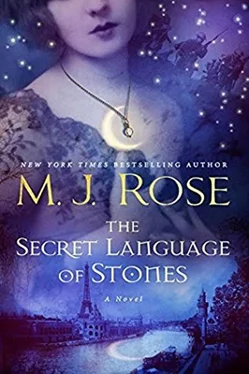The sun hadn’t yet set and an almost festive feeling blew in the breeze. Bertha hadn’t dropped any bombs in two weeks, and a false sense of security was making all of Paris nearly giddy. As I strolled, I thought about how alone I was. I could have brought Grigori with me; he was always willing to accompany me to my great-grandmother’s. But I’d endured enough of his melancholy the night before.
My destination was located on a lane blocked off from rue des Saints-Pères by wide wooden double doors. One of a half dozen four-story mid-eighteenth-century stone houses, it shared a courtyard that backed up to rue du Dragon. Hidden clusters like this were a common configuration in Paris, affording privacy within the bustling city. Usually the porte cochère was locked and one rang for the concierge, but on busy nights the heavy doors remained ajar and I didn’t need to wait for service.
I stood on the stoop and lifted the hand-shaped bronze door knocker and then let it drop. All the noise emanating from inside muffled the sound. Dismayed but not surprised, I found Maison de la Lune more crowded than usual. In the salon, my great-grandmother entertained her visiting crop of soldiers with food and drink, music and conversation.
“I don’t know how to turn any of them away,” she confided as she offered her cheek for me to kiss. “I hope you won’t be too cross with me, Opaline, but I put two of them up in your bedroom and made up the daybed in my suite for you.”
Of course I was, even if I didn’t show it. But I was never completely comfortable in this house anyway. It hardly mattered where I slept. The ancient maison was too old and there were too many secrets and too much history here. I always felt as if I’d just missed learning something about myself and my family that I needed to know. And the overflow of strangers-most of whom drank too much and enjoyed sex too loudly and took what I thought was advantage of my great-grandmother’s largesse-made it feel even less like a home.
“You are cross with me. I see it in your face. Just like your mother, your anger pinches your eyes and, like me, flashes there.”
We were in the grand salon. The most opulent room, where my great-grandmother held court. The colors of the fabric wall coverings and carpets chosen to complement her coloring-dark red hair, peach skin, topaz eyes with fire opal highlights. The museum-quality furniture was ornate. The walls were crowded with paintings and the tabletops laden with treasures-all holding special significance for her.
I worried the visiting soldiers might be tempted to lift some of the objets d’art. It would be so easy. In between the windows stood an almost full-size marble sculpture of Diana wearing her crescent-moon headpiece. The double string of gray pearls that hung around her neck was worth a fortune. My great-grandmother’s favorite lover had put them there more than forty years before, and Grand-mère said she left them because they reminded her of him.
With just one gesture they could be off her neck and in someone’s pocket. And the pearls weren’t the only valuables to make off with. Enticing, curious oddities and fanciful amusements gleamed and shone from every corner.
A priceless collection of Japanese netsukes of men and women in erotic poses graced one table. Silver repoussé vases studded with onyx, turquoise, and amethyst and decorated with iridescent peacock feathers were tucked in corners. On the mantel were a half dozen birds’ nests made from spun silver, each holding eggs carved out of precious stones. On the top of the grand Bösendorfer piano sat a collection of tiny enamel- and jewel-framed miniatures of women’s eyes and breasts painted on ivory.
But my great-grandmother was too happy taking care of her boys to worry about losing a jade frog with ruby eyes or a salamander made of gold. She wasn’t alone in her war efforts; she just offered more delights than most of the other godmothers, or marraines de guerre , as they were known, women who wrote to soldiers at the front who had no family. Too many people had lost their homes because of the bombings and in the wake of the destruction had scattered and lost touch with their sons and brothers, fathers and husbands, at the front. The godmothers sent long letters and care packages and did wonders at keeping up the armed forces’ morale.
Generously, my great-grandmother’s letters to the boys always included an invitation to the Maison de la Lune when the soldiers came to Paris on leave. She opened the doors of her elaborate house, put them up, fed them, soothed them, and made sure there were lovely girls to offer them the kinds of entertainment they most craved.
The men fighting for France deserve nothing less than to be treated like the most wealthy industrialists and bankers who we have always catered to and lived off of, Grand-mère often told me. She thrived on what she did for the troops, and while I admired her for it, I hated being in the house with all the soldiers, all strangers, all trying to forget where they’d been and what they were required to go back to. Even if they bantered and joked, ate and drank and laughed and danced, I could see the suffering and fear in their eyes, the residue of the nightmares they’d lived. Their suffering overwhelmed me. I soaked it up like a sponge and became subdued, depressed, and haunted by it.
“They need your good cheer and smiles,” my great-grandmother would chide me. “Not your pity and tears.”
But I had nothing else to offer, so often, instead of dining with them in the overcrowded dining room, I asked for a tray to be brought to me in my grandmother’s suite and went upstairs, past the haunting portraits of all the female descendants of the original sixteenth-century La Lune.
My great-grandmother’s boudoir nestled in the far corner of the second floor. I opened the door and, for a moment, stood enthralled anew by its loveliness. Here too the fabrics and carpet were chosen to set off Grand-mère’s red hair. But the murals captivated me the most. My father’s friend, the celebrated artist Alphonse Mucha, had painted a pastiche of the four seasons covering the walls. In high Art Nouveau style, winter scenes segued into spring, then summer, and finally fall. Through each season, a woman wandered, a younger, stylized version of Grand-mère who could have been me with her long russet hair, almond fire opal eyes, and pale skin.
In the corner of the room, an ornate wrought iron staircase led up to my great-grandmother’s private library. Beside the expected classics and volumes of exotic and provocative erotica, I’d been surprised to find shelves devoted to the occult as well as gothic and horror fiction. Ever trying to understand and come to terms with the storied history of the house and our ancestors, she read everything, looking for clues and answers. Sharing her morbid fascination and equally curious, I’d made my way through Bram Stoker, Henry James, Edgar Allan Poe and Maurice Level and Villiers de l’Isle-Adam. I’d even stumbled on a book with my grandfather’s ex libris plate pasted in the inside cover, The Picture of Dorian Gray . Seeing me reading it, my great-grandmother told me my mother had brought it with her when she’d first come to Paris.
While I ate my dinner, I read from a book of ghost stories by Edith Wharton. There was, for many of us, a great escape in reading about the fantastic and supernatural during wartime. Terrors more terrible than those we were living through gave us an outlet for our anxiety. Some found it strangely hopeful to read fiction suggesting there was more to our existence than what established religions suggested.
I fell asleep reading Wharton’s Tales of Men and Ghosts . Some hours later, I woke up from a terrible dream. But it wasn’t a dream. The sound of weeping was real. Lonely and anguished, these were the kind of tears that could only be shed in the darkest hour of the night. Could it be my great-grandmother? I looked over at her bed. No, she was quiet and calm. I should have known better. I’d never even seen her eyes fill. She’d told me once she’d used up her quota of tears when her son, my grandfather, died the year before I was born.
Читать дальше












